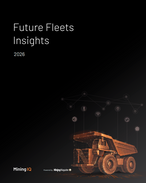This article is 2 years old. Images might not display.
In early 2023, Canadian junior Wolfden Resources applied to rezone a 374-acre piece of its 7135-acre Pickett Mountain project in Northern Maine. To earn a metallic mineral mining permit from the state, Wolfden must gain LUPC approval first.
As part of its review process, the LUPC announced in July that several public hearings would be held, allowing residents and stakeholders to voice their support or concerns.
During three days of hearings, which were also live-streamed on YouTube, October 16-18, a group comprised of the Penobscot Nation Holton Band of Maliseet Indians, Natural Resources Council of Maine, Conservation Law Foundation and the Maine Autobahn voiced opposition to the rezoning.
The collective cited rock formation seepage, fluctuating groundwater levels and leaking mine liners as potential pollutants that could arise from the mine.
Wolfden's plans to construct a "state-of-the-art, small footprint" underground polymetallic mine include the double lining of walls and integration of a reverse osmosis filtration system to clean dirty water, Jeremy Ouellette, Wolfden's vice president, said during the hearing.
However, almost a dozen speakers at the hearing urged the LUPC to deny the application.
One of those was Stu Levit, a Montana-based staff scientist with The Center for Science in Public Participation. Levit, who has worked in the mine reclamation/rehabilitation and cleanup space for two decades, acknowledged the merits of Wolfden's water filtration ambitions but underscored the immense cost.
Levit said the ultra-filtration and reverse osmosis were "good technologies" but are "very expensive" to operate. He also pointed out that Wolfden's current mineral data was insufficient and unable to estimate the cost of those technologies accurately.
Aside from the environmental toll and cost, Levit also raised concerns about Wolfden's inability to present a mine where it has been integrated successfully.
"It's easy for a company to promise to do something, and it's another to actually design or plan something to deliver it," Levit told the LUPC hearing.
Local support
As the hearings heard opposition from some expert witnesses from across America, some of the project's most adamant supporters were also on hand to testify in favour of the project.
One supporter and local resident, Terry Hill, took issue with non-Maine residents prioritising pristineness over the livelihood of locals.
Hill told the panel that his entire family supported the project because it would introduce much-needed industry to the area.
We need to have industry along with tourism," Hill said during the livestreamed session.
State senator Peter Lyford also testified in support of the project, explaining that the state's environmental protections would provide the necessary safeguards.
"I believe Chapter 200 includes more than adequate protection for our natural resources," he said. I'm interested in seeing if a Maine mining market is possible under Chapter 200 and hope that you're willing to allow Wolfden resources to be the first to test these stringent rules under 200."
Established in January 2017, Chapter 200 set rigorous standards for the state mining sector, including prohibiting wet storage of tailings and the use of wet mine waste units after mine closure.
The legislation also requires independent third-party inspection to monitor compliance with permit conditions throughout construction, operation, and closure and financial assurances that the company can address a worst-case scenario incident.
A final day of public hearings will be held on October 23, 2023, before the LUPC's final decision.
























